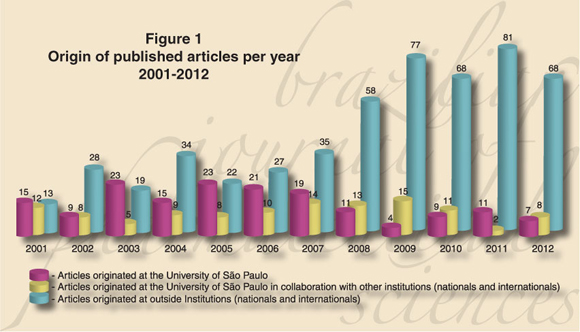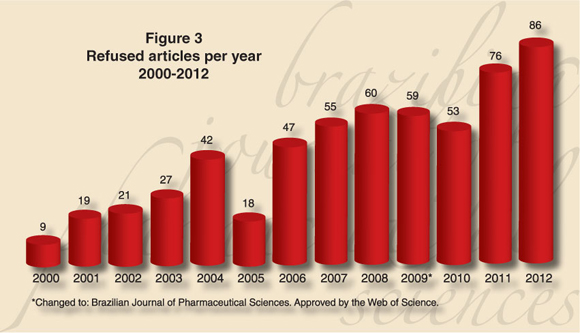EDITORIAL
There is no doubt that quantitative methods are useful for assessing scientists, but using them exclusively while abdicating the subjective capacity of identifying people who are talented, creative, or simply geniuses, is a surefire way of excluding the few people that can really make groundbreaking discoveries from a scientific career. This attitude exempts those responsible from taking and defending decisions. It is intellectual cowardice hidden behind mathematic algorithms."
we ask the question: Would it be that the same applies to the analysis of periodicals? Would it be that the national Editors should begin questioning their current stance in the quest for indexes? Perhaps the periodicals are being assessed in much the same way as scientists, an approach known to lead to practices unfavorable for promoting the quality of the science published; the majority of researchers are more concerned with the number of papers published, the amount of citations received, and in which high-impact journals they were published. Editors, for their part, are more concerned about the impact factors of their publications, which in turn leads to a growth in plagiarism, increased self-citations, manipulated citations, the practice of "salami science" - splitting a single investigation into several publications, artificially generating a greater number of citations in the academic milieu, uncommendable conduct such as exchange of citations between authors, self-citation, self-plagiarism, etc... And reiterating the point, where is the quest for quality? And, as Reinach points out, the aim of science is no longer to understand nature but is gradually becoming about being published and cited.
As the executive editor of the Brazilian Journal of Pharmaceutical Sciences I can vouch that our publication has been free of undesirable citation practices and upon analyzing our annual statistical data released by SCImago Journal Rank, can proudly note the negligible number of self-citations. This conduct has garnered great respect for our work and, although our indexes have shown a moderate rise (Table I), we remain firm in the belief that this growth was based purely on scientific content which, subjected to rigorous peer review, has led to the publication of quality articles. We are convinced this is the science we should be promoting!
By contrast, the national periodicals which strive for higher indexes assume the underestimated role of providing a channel for the scientific output which has not made it into international journals and, moreover, in accordance with the new assessment criteria adopted by the Coordination for the Improvement of Higher Education Personnel (CAPES) under a single framework, Brazilian journals compete with international periodicals and occupy lower rankings on Qualis, which in turn influence the analysis of the country's post-graduate courses. Additionally, there is the matter of studies that although lacking great international appeal, are extremely important for furthering ideas and research in their local regions. As aptly put by the researcher Vanderlan Bolzani: "the fact you publish in national journals does not mean your work lacks merit or quality".
We still recognize however, that we must seek ways of achieving dissemination and impact while boosting the credibility of the BJPS in the International scientific community. To this end, we are seeking exchange in academic collaborations, an approach evident in our statistics. Parallel to the rise in the number of studies published, there is a proportional increase in the number of articles published from abroad. Likewise, the number of articles originating from other States in Brazil has also risen. Thus, there is no endogeneity and the periodical increasingly represents the Pharmaceutical Sciences carried out in Brazil while steadily revealing its international side (Figure 1). The publication of a special edition was planned for this year, a goal to be attained shortly through the publication of a special edition on "Dendrimers" which shall carry articles of relevance to the field authored by internationally renowned specialists.
At this juncture, it is also pertinent to express our acknowledgement of the need for using the English language in the dissemination of science. Four years after adopting the English language as its official vernacular, the Brazilian Journal of Pharmaceutical Sciences has benefited from greater national and international recognition and with this an increased responsibility to meet the quality standards required.
Today, we have set targets for achieving sustainable growth, growth which can undoubtedly be attributed to the journal's indexation in the main leading Databases such as ISI-Thomson Reuters, Scimago/Elsevier, SciELO, International Pharmaceutical Abstracts, Scopus among others. The impact factor of the BJPS in the Science Citation Index, following its inclusion in 2010 (Table I) and based on statistical data released by Scimago/Elsevier, shows a rise to 128 citations within a one-year period, as well as increases in the other indexes.
The 2012 period saw a 45% increase in the number of studies submitted (Figure 2) compared with a 42% rise for 2010-2011. This figure reflects the interest in publishing in the BJPS, given its quality and recognition via indexation in International databases. The adoption of the Associated Editors system in the areas of Drugs and Medications, Pharmaceutical Assistance, Clinical and Toxicological Analyses, and Food and Nutrition was a another step toward refining the previous work of co-editing the publication and allowed a larger panel of "ad hoc" reviewers with definitions of areas of practice and specialty, aimed at improving the efficiency of the publication process. The rigor in appraising the studies submitted, coupled with the efficiency of the co-editing work, led to the rejection of 86 (eighty-six) articles in 2012, accounting for 32% of total articles submitted (Figure 3). This fact reflects the previously outlined pursuance of quality, and even with an internationally young collection, we hope to reach the global average for impact factor, confirming that ethical conduct does pay off.
It is also worth mentioning that, in agreement with Reinach (2013), there is a pressing need for return of innovative thinking, incentives for creativity and logical reasoning. We realize that only gradual growth is sustainable and perhaps with this ideology we may one day declare that the Brazilian Journal of Pharmaceutical Sciences has published a groundbreaking discovery. Ultimately, the geniuses overlooked by the quantitative process of assessment can see their studies published in periodicals that do not offer major impact but whose standing is marked by their ethical conduct.
I would like to extend my thanks to the Scientific Editor of the BJPS, Prof. Elizabeth Igne Ferreira, for the opportunity to express these ideas, and trust that these may contribute to the discussion among national scientific editors.
Leila Rangel de Carvalho Aranha
Executive Editor
Brazilian Journal of Pharmaceutical Sciences
REFERENCES
ALISSON, E. Revistas científicas brasileiras ainda têm baixo impacto internacional. Agência Fapesp, São Paulo, 16 oct. 2012. Available at: <http://agencia.fapesp.br/16332>. Access on: 10 jun. 2013.
ESCOBAR, H. Ranking coloca revistas científicas brasileiras em risco de extinção. O Estado de São Paulo, São Paulo, 06 jul. 2009. Available at: < http://www.estadao.com.br/noticias/impresso,ranking-coloca-revistas-cientificas-brasileiras-em-risco-de-extincao,398294,0.htm>. Access on: 06 jun. 2013.
REINACH, F. Darwin e a prática da "Salami Science". O Estado de São Paulo, São Paulo, 27 abr. 2013. Available at: <http://www.estadao.com.br/noticias/impresso,darwin-e-a-pratica-da-salami-science-,1026037,0.htm>. Access on: 06 jun. 2013.
RIGHETTI, S. Brasil cresce em produção científica, mas índice de qualidade cai. Folha de São Paulo, São Paulo, 22 apr. 2013. Available at:<acervo.folha.com.br/fsp/2013/04/22/15/>. Access on: 06 jun. 2013.
SCIMAGO Journal Rank. Available at: <http://www.scimagojr.com/journalsearch.php?q=19700182901&tip=sid&clean=0>. Access on: 04 jun. 2013.
SLOBODIAN, V. "Salami Science", autoria contestável e o alpinismo científico. Polegar Opositor, São Paulo, nov., 2011. Available at: <http://polegaropositor.com.br/filosofiadaciencia/%E2%80%9Csalami-science%E2%80%9D-autoria-contestavel-e-o-alpinismo-cientifico/>. Access on: 06 jun. 2013.
ZAGO, M. A. Perfil da produção científica brasileira. São Paulo: FAPESP, 2011. (mesa de discussão tecnológica, Inovações Tecnológicas no Brasil). Available at: <http://www.fapesp.br/eventos/2011/06/Marco_Antonio.pdf>. Access on: 10 jun. 2013.
- ALISSON, E. Revistas científicas brasileiras ainda têm baixo impacto internacional. Agência Fapesp, São Paulo, 16 oct. 2012. Available at: <http://agencia.fapesp.br/16332>. Access on: 10 jun. 2013.
- ESCOBAR, H. Ranking coloca revistas científicas brasileiras em risco de extinção. O Estado de São Paulo, São Paulo, 06 jul. 2009. Available at: < http://www.estadao.com.br/noticias/impresso,ranking-coloca-revistas-cientificas-brasileiras-em-risco-de-extincao,398294,0.htm>. Access on: 06 jun. 2013.
- REINACH, F. Darwin e a prática da "Salami Science". O Estado de São Paulo, São Paulo, 27 abr. 2013. Available at: <http://www.estadao.com.br/noticias/impresso,darwin-e-a-pratica-da-salami-science-,1026037,0.htm>. Access on: 06 jun. 2013.
- SCIMAGO Journal Rank. Available at: <http://www.scimagojr.com/journalsearch.php?q=19700182901&tip=sid&clean=0>. Access on: 04 jun. 2013.
- SLOBODIAN, V. "Salami Science", autoria contestável e o alpinismo científico. Polegar Opositor, São Paulo, nov., 2011. Available at: <http://polegaropositor.com.br/filosofiadaciencia/%E2%80%9Csalami-science%E2%80%9D-autoria-contestavel-e-o-alpinismo-cientifico/>. Access on: 06 jun. 2013.
- ZAGO, M. A. Perfil da produção científica brasileira São Paulo: FAPESP, 2011. (mesa de discussão tecnológica, Inovações Tecnológicas no Brasil). Available at: <http://www.fapesp.br/eventos/2011/06/Marco_Antonio.pdf>. Access on: 10 jun. 2013.
Indexes vs. quality: considerations on how we analyze our publications and Science in Brazil
Publication Dates
-
Publication in this collection
25 July 2013 -
Date of issue
June 2013





